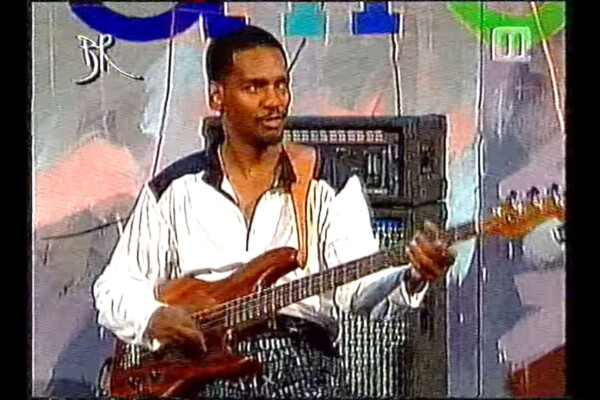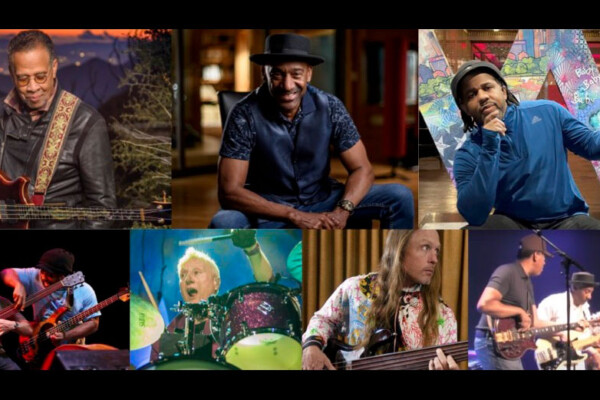A Review of Lenny White’s “Anomaly”
 For his first solo album in 10 years, Lenny White stated his intention of putting the rock back into jazz-rock.
For his first solo album in 10 years, Lenny White stated his intention of putting the rock back into jazz-rock.
“We need to restart a revolution to take back the music and stop the fluff”, he says.
And Anomaly is some heavy stuff: powerhouse backbeats, grinding organ and shredding guitars. There is some excellent music on this record but some will share my feeling that the rockier numbers suffer from bombastic production. It took me a few listens to get it, and this is a record that rewards those repeated listens.
We are talking about one of my musical heroes. Lenny played on Miles Davis’ Bitches Brew at 19 and, drumming with Return to Forever, he set the fusion benchmark in the 1970s. He released two jazz-rock solo albums which were regarded by many as the epitome of fusion. Venusian Summer remains one of my favorite records of all time, combining funk intensity, soloing abandon, synth experimentation and a range of textures. Adventures of Astral Pirates was a landmark with its progressive rock and funk influenced jazz fusion. Don Blackman and Nick Moroch from that band return as key collaborators here.
Lenny declared that he “….really wanted to rock out on this project. Early on, David Bendeth said to me, ‘No one has made a jazz-rock or fusion record with the sound of a rock record.'”
That sums up the approach here. The rock production approach is that of modern heavy metal rather than vintage Led Zeppelin rock. The drumming is stupendously good and there is some incredible playing but the sound of some tracks is relentless and the layers of synthesizers sometimes seem to suffocate the humanity in the groove. A great deal more space and silence would have been more welcome here.
It’s an approach that only a musician working outside of a major record label could attempt. It’s a bold effort and White deserves every credit for going with his heart and his vision. This harks back to a 70s approach when jazz-rock was still an experiment rather than a genre. But the best of 1970s jazz-rock had a rawness in sound, in playing and in production, that some tracks lack. The sounds and playing are at times too perfected and clean, the bass lines too unwavering.
“Drum Boogie” was written by White 25 years ago. It opens with a intense unwavering bass line, played by Victor Bailey and doubled with come headphone destroying ultra-low synth bass from Bernard Wright. White plays some syncopated magic on the groove as Donald Blackman romps on down-home organ. Nick Moroch solos blisteringly on guitar.
“We Know” is instrumental rock/metal of the kind found on Steve Vai CDs. Stanley Clarke makes a guest appearance on bass and proves a fine rock bassist. There are touches of prog, intense guitar workouts from Moroch and David Bendeth and a machine gun bass solo from Clarke. Keyboards fill in the spaces and Lenny channels John Bonham. It’s fun but might have benefited from a little more room to breathe.
“Forever” is something else, a progressive rock/funk influenced tribute to Michael Jackson written by White in collaboration with Nicki Richards. Again, the bass lines are a little unwavering and the layers of guitar, keyboards and drums are very dense with the drum overdubs a little too much at times. Nicki Richards sings her own lyrics and does a good job in a Gospel/Soul style and Jimmy Herring adds his angular Allan Holdsworth-influenced guitar – not a combination I expected to hear but it is a tune that sticks in your head.
David Gilmore’s “Dark Moon” is a delight. David (no, not the Pink Floyd one) is one of the most talented guitarists around and this track benefits from a range of textures and creative use of dynamics. It’s an upbeat tone poem. Bailey plays subtle acoustic bass, Wright adds sensitive piano and White drums fluidly and wonderfully creating more intensity at the lowest volumes than the highest. Gilmore plays fabulously on this.
The Joe Henderson tune “Gazelle” is another highlight. This is light, intense jazz-rock with shifting metres and grooves that builds organically. Bailey grooves away on bass, unencumbered by synth doubling. White chatters around the kit excitedly. George Colligan plays a lovely electric piano solo and Tom Guarna some snaking, fluid guitar. This is loose limbed creative group improvisation at its best.
Guarna’s composition “If U Dare” is up next featuring the same quartet as the last track. It has a very different feel though. White plays an exciting drum intro figure redolent of “Immigrant Song”. Bass throbs in and Colligan adds suspended chords. When Guarna plays the theme on guitar a flamenco tinge is introduced. There are twists and turns in the track which is reminiscent of Return to Forever. These three beautiful fusion tracks form the core of this record.
“Election Day” has a Black Rock Coalition vibe. It’s quite an exciting rock groove. Lenny wanted to have a rock track with strings like Led Zeppelin’s “Kashmir”. It creates a suitable celebratory mood to commemorate the election of President Barack Obama. The rock drum groove is wonderfully Bonham-esque and Bernard Wright’s gorgeous synth solo and Nick Moroch’s striding guitar solo hit the spot. The most successful of the rock tracks for me.
“Coming Down” is slightly quieter and an effective contrast, with some splendid rock solid fretless bass from Bailey, rock drums from White, funky squiggly synth from Wright and stadium fusion guitar from Guarna. Bailey gets to take a short fretless bass solo that develops a motif to create an intense improvisation.
“CatLett Out The Bag” is a jam named for Big Sid. It features Lenny White in one channel and Mike Clark in the other. A 70s fusion masterclass, Clark is one of the most grooving drummers ever, and formed part of the famous Headhunters rhythm section. The track is anchored around Wright’s synth bass and Danny Walsh’s R&B alto saxophone. The texture changes when Tom Guarna enters with a hot guitar solo that teeters on the edge of cliché, but just manages to avoid it.
“Water Changes Everything” is something else again, featuring a vocal choir. “Basically, I had written this piece of music and after the fact a friend of mine told me about a charity called Water where they build wells in Africa where people don’t have any water and have to travel six hours to get water in some cases, and it’s not really drinkable water. So we put some words together to address this issue and I got some of my great singing friends to sing on it. I wanted it to be like a ‘We Are The World’ kind of thing, where everybody sings a piece of the verse. And I think you get the message,” says White.
“Anthem” is George Colligan’s stadium rock-jazz piece, again redolent of Return to Forever’s more prog rock pieces. Richie Goods plays some lovely bass, taking more room than Bailey for fills and runs and creating a syncopated rock texture in a tune dominated by layers of Colligan’s keyboards. Goods even gets to double some melody lines. The tune sounds at times like a fabulous White drum solo accompanied by grooving rock-jazz bass and washes of rock keyboards.
“The Wait has Lifted the Weight” features a spoken intro by White – a speech originally intended to form part of an opera on the National rite of passage experience of the 2008 US election. There is a strong blues solo from Wright on incredibly guitar-like synth as well as expansive piano over an orchestral sounding production, Charles Fambrough plays solid, stately and deeply grooving upright on this tune.
Lenny White has made a record here which will divide listeners. Isn’t that better than making an inoffensive, safe record that everyone thinks is OK but nobody loves? He is passionate about what he’s trying to do here and fans of both rock and jazz will find plenty to enjoy here. It’s so different to expectations that it can take a few listens to acclimate to. All credit for Lenny for following his heart!
Preview and download Anomaly
Anomaly Personnel:
- Lenny White (drums, keyboards, spoken word, orchestration etc);
- Nick Moroch; David Gilmore; Tom Guarna; Jimmy Herring; David Bendeth (guitar);
- George Colligan; Bernard Wright; Donald Blackman; Vince Evans; Jerry Z (keyboards);
- Victor Bailey; Richie Goods; Charles Fambrough; Stanley Clarke (bass);
- Tim Ouimett (trumpet); Danny Walsh (alto and tenor saxophone);
- Mike Clark (drums);
- Chris Williams, Vaneese Thomas, Gregory Clarke, Nicki Richards, Irene James, Michelle Weeks-Reynoso (vocals)
Anomaly is available from Amazon.




“The rock production approach is that of modern heavy metal”????? maybe if the article was written in 1992…..
Well I don’t listen to much metal so I tried to find a reference. Yeah, no guitars tuned down to C#. 1992 is pretty modern for me, sorry! ;)
Abstract Logix have out an Anomaly preview video up on Youtube:
http://www.youtube.com/watch?v=TQFL8j4wv34
I think they may mean, that with you modrn rock production it may be the thicker and more compressed sound, not as much as the #D or #C guitar, production and cd recording has changed alot over the past few years. But hey who knows =]